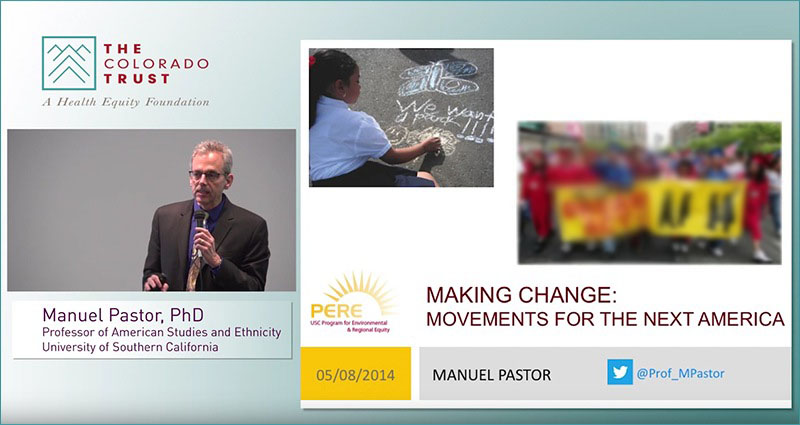Health Equity Learning Series: Messages That Resonate
Leer en español
Manuel Pastor, PhD, Professor, University of Southern California
How do you build a social movement?
It takes a vision, an authentic base, a scaffold of solid research, a commitment to the long haul and a willingness to collaborate, said Manuel Pastor, PhD, a professor of sociology, American studies and ethnicity at the University of Southern
California.
Pastor was a powerful contributor to the second year of The Trust’s Health Equity Learning Series, which invites national leaders to discuss health disparities and how to fix them. The free educational events are open to the public and average 150 attendees.
His work as an organizer, researcher and teacher has focused primarily on large urban areas, especially in California. He spoke specifically about the success of the Dreamers—undocumented immigrants who came to the U.S. as young children—in forging a political identity as Americans, using California communities as a base.
Pastor’s message resonated with his Denver audience. An organizer from Padres & Jóvenes Unidos—which has fought against the school-to-prison pipeline in Colorado—asked how to apply his lessons to ensure accountability in the implementation of new policies. Pastor drew on his experiences in Los Angeles to illustrate examples of how to work with existing organizations like community colleges, unions and police to make sure practices live up to the policymakers’ intents.
Perhaps more surprisingly, his words sparked animated conversations in rural communities like Gunnison, Steamboat Springs and Telluride, where local, live-streamed viewings were made possible through grants from The Trust to local organizations.
These towns have little in common with a place like Los Angeles. Still, Pastor’s lessons of engaging a disenfranchised population and tapping its power had far-reaching appeal.
Of all the learning series speakers in 2014, “Pastor had the most relevant presentation for our communities,” said Erich Lange, a program analyst for the Tri-County Health Network in Telluride, one of the grant recipients. “As we are trying to unveil our own health equity movement in our region, his lessons and insight were invaluable in helping us develop a plan for social change.”
Audiences of the learning series also heard from documentarian Llewelyn Smith and news executive Laura Frank on how to understand and tell stories about inequality, and from Mildred Thompson, director of the PolicyLink Center for Health Equity and Place, who spoke about how a lack of access to public transportation, good schools and parks have become barriers to health for many people of color.
Through The Trust’s grants, the series was seen in 18 communities around the state, from cities like Aurora, Boulder and Grand Junction to small towns like Craig, La Junta and Trinidad.
Watch Pastor’s full presentation below.
Video provided by Open Media Foundation

